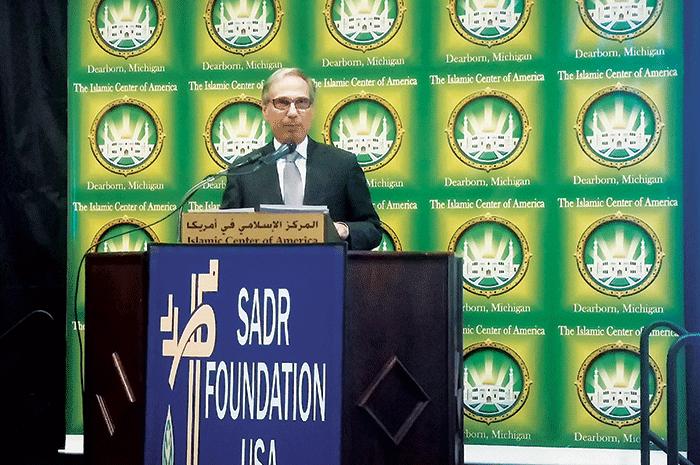
The foundation tends to the social, economic, educational and health needs of thousands of men and women in Lebanon’s underserved areas.
ISF was established in 1965 by Imam Musa al-Sadr, a Lebanese religious and political leader. Sadr disappeared in Libya in 1979 and is presumed dead after several former Libyan officials claimed that late dictator Muammar Gaddafi murdered him. His sister Sayyida Rabab al-Sadr Charafeddine filled his position as chairperson of the foundation, which has focused on gender equality and paid special attention to female orphans.
In 1999, ISF registered as a nonprofit organization in the United States. The foundation was also granted a special consultant status with the United Nations Center for Psychology and Social Change.
Rabab Sadr’s son, Raed Charafeddine, who is the vice governor of the Lebanese National Bank, delivered the keynote speech at Saturday’s dinner. He said the regional developments in the Middle East— which is witnessing a refugee crisis resulting from the war in Syria— required the foundation to step up its humanitarian efforts.
“Besides our traditional role as care and relief providers, we are undertaking complex missions as seekers of social change and social justice through empowerment, participation and good citizenship,” he said.
Charafeddine called Lebanese expatriates the “true wealth of Lebanon.” He discussed the foundation’s programs, including the Early Childhood Intervention Center of Lebanon, which serves children with disabilities, and the Spinal Cord Injuries Care Unit.
“Your organization, the Sadr Foundation, enjoys high standing among those who seek solutions for humanitarian and developmental crisis,” Charafeddine told the crowd. “This standing gives rise to engagements and responsibilities.”
To demonstrate the foundation’s impact, Charafeddine played a video of a girl who lives at one of the organization’s orphanages. The girl described being able to go to school, eat sufficiently and sleep in a comfortable bed in a loving environment at ISF.
Imam Mohamad Mardini of the American Muslim Center thanked ISF for its efforts and stressed the importance of charity in Islam.
“The creator gave us all what we enjoy; let us give a share of it,” Mardini said.
Dr. Lobna Fakih, who emceed the evening, highlighted the virtues of taking care of orphans in Islam.
“Our religion shows great deal of sympathy to orphans and I would like to remind you that our beloved Prophet Mohamad was an orphan,” she said.
Fakih said the word “orphan” is mentioned 23 times in the Quran.
Rep. Debbie Dingell (D-Dearborn) left the ceremony early after she was confronted by an organizer who voiced his objection to her attendance at Benjamin Netanyahu’s speech before Congress on March 3. Forty-seven of her fellow Democrats boycotted the controversial speech.
“You can either be here or there,” ISF executive board member Mohamad Bandar said he told Dingell, referring to her presence at the Israeli prime minister’s address on Capitol Hill. “You cannot be in both places.”
He said he also told her that he will not be voting for her reelection in two years. Dingell said she felt insulted and left shortly after her conversation with Bandar, according to attendees of the event.
Also notable was the absence of Imam Hassan Qazwini, who is on the ISF advisory board.






Leave a Reply